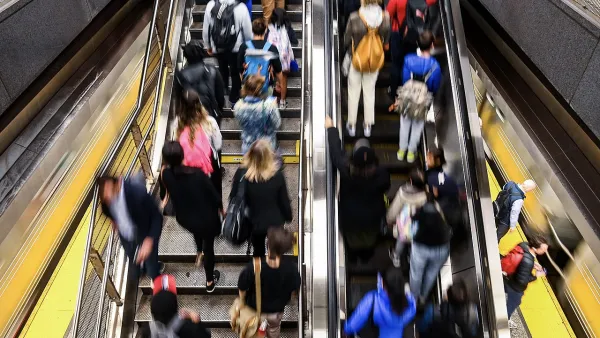Public transit systems in major U.S. cities are struggling to restore their image after rising crime rates led to heightened security concerns among riders.

In a detailed piece in Governing, Jake Blumgart outlines the security issues faced by mass transit systems around the country that are keeping some riders from returning. “There are many reasons why transit ridership has not returned after the pandemic. The major factor, most experts agree, is the rise of remote work for many white-collar professions.” But recurring COVID-19 infection surges and the fear of crime also play important roles.
Blumgart highlights New York City’s transit system, where “Mayor Eric Adams won his election with promises to save New York and its subways through a judicious application of law and order.” Now, six months after Adams took office, “Conservatives feel that Adams hasn’t put enough officers in the subway system and is too focused on social services as an answer. Progressively inclined activist groups argue that while they are not anti-police, overly broad orders to crack down on minor offenses are oppressive and likely to disproportionately target Black riders.”
Blumgart describes the challenges faced by the Adams administration and other city leaders in balancing public safety with equity and efforts to improve social services and housing options for people experiencing homelessness. “As transit agencies face fiscal realities borne of fare losses, they must also confront an existential question of public order alongside the law enforcement institutions that are suffering their own legitimacy crisis.”
As Blumgart writes, “New York is the Democrat-dominated city most publicly struggling with this tangled knot of policy questions. But all of the nation’s big cities will have to figure out how, or whether, they will have their police maintain the bright lines of conduct on their buses and trains.”
FULL STORY: Progressive Cities Have a Public Order Problem on Mass Transit

Planetizen Federal Action Tracker
A weekly monitor of how Trump’s orders and actions are impacting planners and planning in America.

Chicago’s Ghost Rails
Just beneath the surface of the modern city lie the remnants of its expansive early 20th-century streetcar system.

Study: Anti-Homelessness Laws Don’t Work
Research shows that punitive measures that criminalized unhoused people don’t help reduce homelessness.

The French Solution to Congested Tunnels: Make Them Car-Free
Bay Area transportation officials keep expanding car capacity. Lyon’s Croix Rousse Tunnel offers a different way.

Missouri Governor Reverses Anti-Discrimination Housing Policies
A new state law bars cities from prohibiting source-of-income discrimination against tenants using Section 8 housing vouchers.

USDOT Launches Unfunded 'SAFE ROADS' Program
The program targets “distractions” and “political messages or artwork,” and paves the way for autonomous vehicles.
Urban Design for Planners 1: Software Tools
This six-course series explores essential urban design concepts using open source software and equips planners with the tools they need to participate fully in the urban design process.
Planning for Universal Design
Learn the tools for implementing Universal Design in planning regulations.
City of Fort Worth
planning NEXT
Mpact (founded as Rail~Volution)
City of Camden Redevelopment Agency
City of Astoria
City of Portland
City of Laramie





























